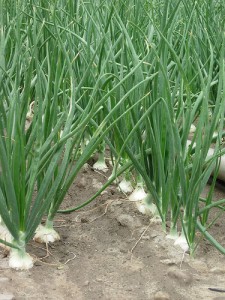Inter allia
August 29, 2010
 [caption id="attachment_1957" align="alignleft" width="225" caption="Onions. By flickr user lady_fox, clicking goes to source page."][/caption]
[caption id="attachment_1957" align="alignleft" width="225" caption="Onions. By flickr user lady_fox, clicking goes to source page."][/caption]
I was raised not to like garlic and onions; my parents hated them and never used them in cooking. But as anyone who cooks knows, they are completely indispensable in the kitchen, and I have learned to love their flavor (particularly pearl onions)!
This Lifehacker post, which is interesting reading by itself, pointed me to this New York Times article about garlic and onions written by the illustrious Harold McGee. I should note the article itself is a review of a book about garlic and onions; the chain is long. Anyway, it’s interesting background into onion researches.
As the article points out, garlic and onions are in fact related, both belonging to the genus Allium, the name of which is Latin for garlic. Shallots, leeks, chives and scallions are also part of this genus. The Germans recognized this early; the names for all of these plants German involve the word for “leek” or “onion” (all translations from LEO).
| English name | Species | German name |
| Leeks | A. ampeloprasum | der Lauch (“leek”) |
| Garlic | A. sativum | Knoblauch (“knob-leek”) |
| Chives | A. schoenoprasum | Schnittlauch (“cut leek”) |
| Onions | A. cepa | die Zwiebel (“onion”) |
| Shallots | A. oschaninii | Frühlingszwiebel (“spring onion”) |
| Scallions | A. ascalonicum | Grüne Zwiebel (“green onion”), Jungzwiebel (“young onion”), Frühlingszwiebel (“spring onion”) |
More from the article:
If you’re using onions or garlic or chives raw, in a dressing or salsa, either chop them just before serving or rinse the chopped pieces thoroughly. Water removes the harsh aging sulfur compounds from the cut surfaces, so you’ll taste only the fresh ones. If you’re heating garlic or onions or their relatives, then cooking whole or coarsely chopped bulbs will moderate their flavor. Crushing or grating will intensify it... [I]f you’re counting on alliums to give depth to stews or braises or stocks, then chop them finely or crush or purée them. Heat will eliminate the bite and develop the aroma.
Perhaps this helps to explain why the garlic in Chicken with 40 Cloves of Garlic ends up so sweet. Since the garlic cloves are kept whole, their flavor stays moderate. Presumably the sulfur compounds aren’t released at all, or are deactivated while the garlic is cooked, while at the same time the cooking develops their natural sweetness.